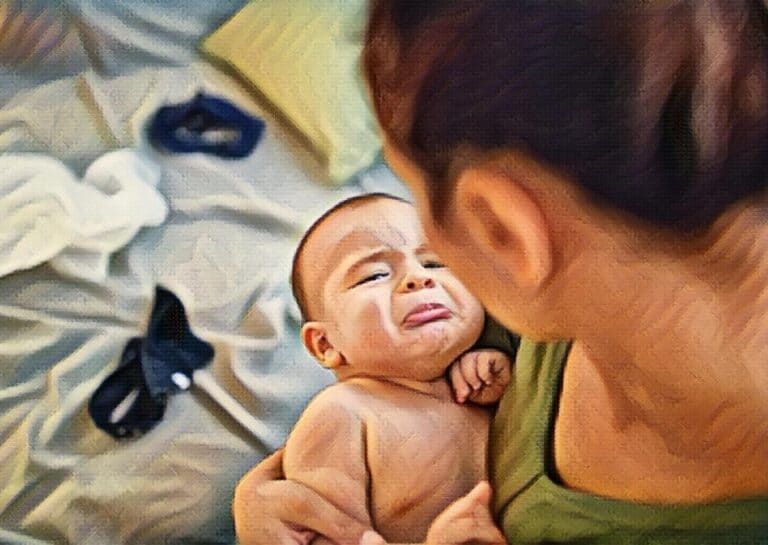Crying is your young child’s main form of communication. They cry when they’re tired, hungry, and need their diaper changed – it’s their way of letting you know they need something. While you know to expect some crying episodes while they’re awake, it can be a little surprising to see your baby or toddler cry while they’re sleeping.
As a parent, your mind may jump to the worst-case scenario. You run through the possible sleep disorders or medical issues crying at night could indicate. But in most cases, the experience shouldn’t cause any concern. In this article, we’ll talk about what a healthy sleep pattern looks like for a child by age, the common causes of an infant crying in their sleep, and what signs and symptoms may indicate something more serious.
Table of contents
Toddler and newborn sleep cycles
First, let’s take a deeper look into the sleep pattern of babies.
A newborn isn’t born with a fully developed circadian rhythm, which is essentially the body’s internal clock that regulates the sleep-wake cycle or schedule. Don’t worry tired parents, their cycle starts to develop as they get older, and nighttime sleep becomes more regular around three months to one year of age. The more their circadian rhythm develops, the longer they’ll begin to sleep through the night.
In general, sleep looks different for newborns, with research showing they experience just two sleep stages as opposed to the full four that adults move through at night. Babies under three months old spend equal time in REM and NREM sleep, otherwise known as rapid eye movement and non-rapid eye movement. People also refer to those stages as active sleep and quiet sleep, because during REM, babies often move, grunt, make noise, and even breathe faster at times. While during NREM those motions and sounds aren’t present, and the toddler will be more still.
The REM stage is when a dream is most likely to occur, though no one is sure how young babies begin to experience things like dreams and nightmares.
Common reasons for crying in sleep
If you do notice your child or toddler crying after they’ve gone to bed, there’s more than likely nothing to worry about. Especially if you notice they’re in a REM cycle, identified by a more active sleep, it’s entirely possible they’re having a dream, even a nightmare. Lighter sleep tends to be associated with experiencing nightmares and dreams. While a night terror is rare, it’s a possible cause, with a few suspected reports of night terrors occurring in toddlers as young as 18 months old. They occur during the deeper stages of sleep, unlike nightmares.
Other causes of crying during sleep can be a bit more apparent. A sick toddler with uncomfortable symptoms like a fever, or teething pain can be a source of discomfort that causes extra fussy sleep sessions, level of comfort in the room such as the temperature being too warm. It’s always important to rule out any possible uncomfortable causes like illness, pain, or distress your child could be experiencing.
In some cases, they could simply be hungry. If you’re worried about their crying and aren’t concerned with waking them, you can also take time to soothe them by breastfeeding or feeding them a bottle. You know your baby best and can best understand the signs of what your child is asking for.
In most cases, crying in their sleep isn’t something that should cause any anxiety for parents.
When to see a doctor
If issues persist, and your toddler has difficulty staying asleep at night or wakes due to crying, a sleep disorder could be a cause. It’s estimated that 25% of children deal with sleeping disorders or excessive daytime fatigue. Insomnia can be a more serious diagnosis behind lack of sleep or inconsolable crying in their sleep that reduces their quality of sleep. Or, you may be a stressed parent handling a hard case of colic, which is excessive crying with an unknown cause in newborns and young toddlers.
If you notice that regular disruptions in their sleep patterns are becoming a habit, and are concerned, it’s always worth it to have a conversation with your healthcare provider. They’ll be able to offer in-depth information and possible diagnosis for any underlying conditions and suggest a course of action for treatment.
As the caregiver, spend time getting to know your baby’s normal sleep patterns and you’ll be able to pick up on any sign that their naptime tears are out of the ordinary. You may feel overwhelmed, but you don’t have to handle parenting life alone. There are so many resources for education that can help you make decisions for your family with confidence. And you should always have the support of an expert you trust.
Everyone wants you to thrive as a parent, and you’ll be able to connect with the resources and support you need so mom and dad can rest easy (and hopefully, so can baby), without all of the confusion and overwhelm.
